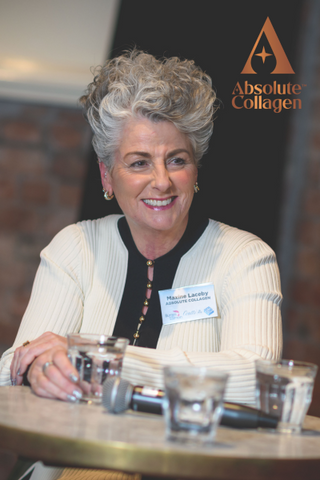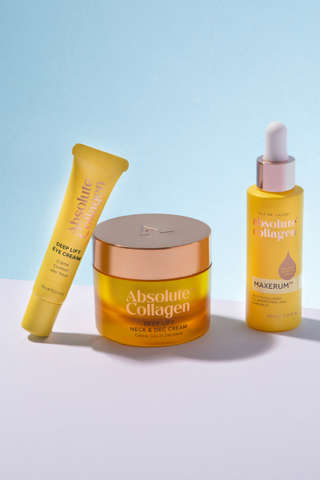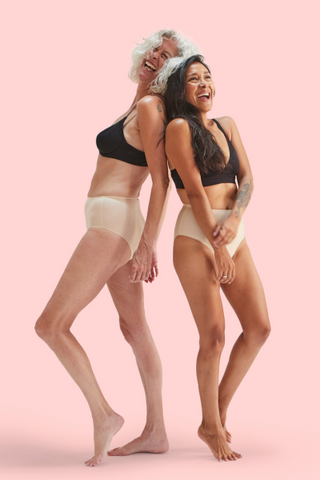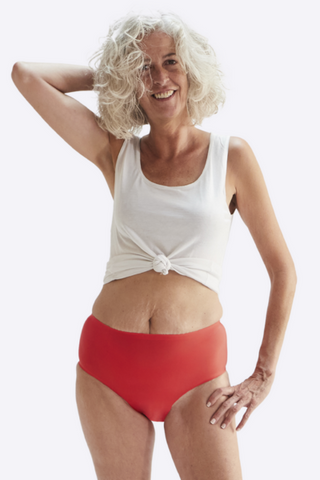Your Skin and Menopause

If you’re in perimenopause and you’re noticing changes to your skin, you’re not alone. In fact, its estimated that around half of all women approaching menopause begin to notice a difference in their skin texture and appearance.
We spoke to number one collagen experts, Absolute Collagen and their team, to find out exactly what happens to your skin during menopause. Here’s what you need to know.
Skin changes during menopause
Dr Fionnuala Barton is Absolute Collagen’s Womens Health and Menopause Specialist. She’s also a Women’s Health GP and Founder of online education platform and independent Menopause clinic The Menopause Medic. We asked her how perimenopause and menopause affects the skin, and she told us:
“Skin changes in perimenopause and menopause are very common. Perimenopause is the term used to describe the ill-defined transition of progressive decline in ovarian production of important hormones oestrogen and testosterone leading to the point of menopause when ovarian hormone production ceases.
Oestrogen in particular is important for maintaining hydration in cells and strong connective tissues holding our skin structure in place. With less of it around we see dehydration, dryness, dullness and an increase in “trans-epidermal water loss” or loss of water from the surface of the skin. With these changes to the integrity of the barrier of skin we are more likely to see irritation, inflammation, increased sensitivity, and break outs as the skin produces more oil to help maintain some moisture.”
Sound familiar? Dr. Barton goes on to explain that this drop in oestrogen can also cause the skin to become more delicate too:
“As oestrogen levels fall in perimenopause and remain low after menopause, the skin becomes thinner and more prone to injury and bruising, and may scar more easily. Blood vessels in the surface of the skin become more visible and cause redness and facial flushing- and if you are someone who has spent time in the sun without sunscreen, perimenopause and menopause is the time we will see the effects of this, such as age spots, pigmentation, melasma, skin tags & moles and pre-cancerous & cancerous growths. We can also start to see unwanted hairs to the chin and along the jawline.”
Collagen production during menopause
So what role does collagen play in all of this? What do we really need to know about it as we progress through perimenopause?
Dr. Reilly is Absolute Collagen’s resident Senior Scientist and has worked in the Skincare and Life Science industry for over 30 years, driving insight and innovation across several expertise areas- including skin ageing, sensitive skin, pigmentation, dandruff and hair growth.
We wanted to know, what are the top signs to look out for when collagen production is decreasing?
Dr. Reilly told us,
“When collagen production decreases, the elastic support matrix of skin begins to weaken and it will show as poor elasticity, sagging skin and wrinkles starting to become evident. However, the problems that cause the decrease in collagen will also affect the upper layers of skin too, so also watch out for dry skin problems with increased pigmentation and uneven skin tone.”
But what is it that causes collagen to decrease, and is there anything we can do to slow it down? Dr. Reilly told us that there an be several factors at play here:
“Inside the body, stress hormones such as increased cortisol, or menopause hormones such as loss of oestrogen, are known to decrease collagen production. External stressors such as UVA radiation or pollution can damage existing collagen and decrease collagen production. Maintaining optimal skin collagen levels requires us to identify the key lifestyle behaviours that need to be addressed to protect the collagen in skin.”
When does collagen production start to decline?
So when can we expect production to start dropping?
Dr. Barton told us,
“With age and through perimenopause, the rate of new collagen synthesis declines- it is estimated that 30% of skin collagen is lost in the first 5 years of menopause. Important connective tissue architecture beneath the skin changes and the skin loses its firmness, appears more slack with increase in permanent lines, larger pores and dynamic wrinkles as well as “jowls” appearing or deeper hollows beneath the eyes. Many women report feeling as though they have aged rapidly overnight.”
Do menopausal skin changes occur in other parts of the body?
So that’s the skin on the face, but what about other parts of the body? Yep, you can expect to see changes elsewhere, too. Dr. barton went on to say:
“The vulval and vaginal skin can experience similar changes, but these areas respond very well to localised topical oestrogen treatments. The other often overlooked area of skin that changes during this phase is the scalp. Again it can become dry, itchy, inflamed and we start to see the hair thinning with a widening of the parting and recession of the hairline.”
Vaginal dryness can be a common menopause symptom, and one that can cause pain or discomfort, sometime making sex less than pleasant. If you do notice this, speak to your GP about treatments that can help.
Can lifestyle changes help with skin issues during perimenopause?
And so, as we know that topical oestrogen treatments are effective in when it comes to vaginal dryness, what can we do to combat the other symptoms that come with a reduction in collagen production?
Dr. Barton told us,
“General measures are important: eat plenty of plants for antioxidants and vitamin C; plenty of healthy fats and protein to provide important amino acid building blocks for the skin; drink enough water to maintain hydration from within and avoid toxins such as alcohol, smoking, caffeine and sugar; prioritise good sleep; get a good skincare regime in place and wear sunscreen.
I recommend SPF 30 at all times, apply more than you think and reapply frequently with a spray you can use over existing make up. This will help reduce risk of skin cancer, age-spots & pigmentation and appearance of blood vessels on the skin as well as prevent skin wrinkles. These can also respond to the addition of active topical treatments such as peptides and retinol. If you have specific concerns or are worried about a skin cancer please consult a dermatologist of a doctor directly without delay.”
And if you’re experiencing dry, irritated skin?
“If your skin is dry and irritated: go easy. Use a gentle cleanser to avoid over-stripping the skin of moisture. Apply fragrance-free moisturisers rich in ceramides and hyaluronic acid that will re-establish barrier function and minimise inflammation and irritation. Avoid abrasive topical treatments without seeking advice from a skin specialist.”
We also asked Dr. Barton about the best ways to combat skin issues in the scalp too. Loss of hair density is a huge issue for many women during menopause, and can lead to a loss of self esteem and self identity. Add to that a dry and itchy scalp, and the end result can be frustrating and upsetting.
Dr Barton explained:
“For the scalp – start treating the scalp in the same way you would treat the face, with gentle SLS-free shampoo & conditioner, cool rinse to sooth, gentle styling tools, less heat/more heat protection, regular leave-in scalp treatments- and ensure diet is optimised. Hair is considered a “non-essential tissue” by the body – i.e. it will prioritise its resources to all other areas of the body first, so ensuring optimal levels of dietary nutrients such as iron for example are important.”

Can collagen supplements help during menopause?
So can collagen supplements really help to support skin health during menopause, or is it already too late? Dr. Reilly told us,
“When skin collagen is lost, then we need to replace it by supporting the skin in its natural production of new collagen. Collagen peptides derived from hydrolysed collagen are proven to do this. The peptides are small chains of 2 or 3 amino acids, which are known to support skin production of new collagen. Vitamin C is also a hero-ingredient that has been proven to support skin health. It is pivotal for collagen production and assembly into a support matrix for skin.”
The bottom line? Collagen supplements can be beneficial to your skin health, but you don’t need to wait until you hit perimenopause before you start to take care of your skin.
Maintaining a healthy and balanced diet, avoiding excess alcohol and smoking, applying sunscreen daily and staying hydrated- of this will help to protect your skin’s existing collagen.
It’s thought that collagen production actually begins to decline from the age of 25 onwards, becoming more rapid as perimenopause hits. So whatever you can do now to support your skin, do it.
Support your own perimenopause journey
Each and every perimenopause journey is different. Just as we all experience our menstrual cycles differently, we’ll go through the transition to menopause in our own way too.
Some will experience more symptoms than others, and with varying degrees of intensity too. But there’s one thing for sure: everyone who bleeds will eventually have their last period. And that’s why it’s so important to know what happens during this time, and how it’s likely to affect you and your wellbeing.
We asksed Dr. Barton for one final piece of advice that all women could follow during their perimenopause journey. She told us,
“My one piece of advice is tune in and be proactive to stay in control. Start tracking symptoms and cycles as this provides a really useful platform of self-understanding and instinctive thinking. Take action early: lifestyle optimisation at this stage is unlikely to cause any harm! Talk to your doctor about options for HRT, most of which are safe for most people and can help stave off, prevent and slow down many of the changes discussed which can often be very difficult to reverse once established. When coming at this informed and armed, it can be a truly empowering time.”
We couldn’t agree more.
Absolute Collagen are a fellow B Corp brand, and fellow Buy Women Built brand, on a mission to help women feel strong in their skin. Their brand new Deep Lift skincare range has been designed to support you and to empower you to live to your absolute possibility, no matter which life stage you're at.













